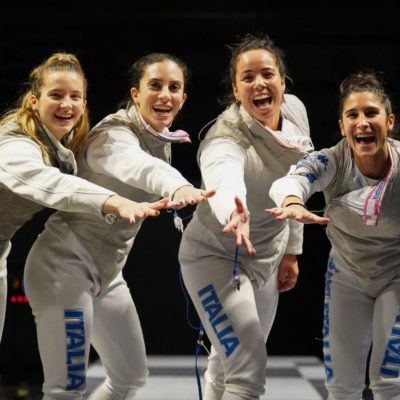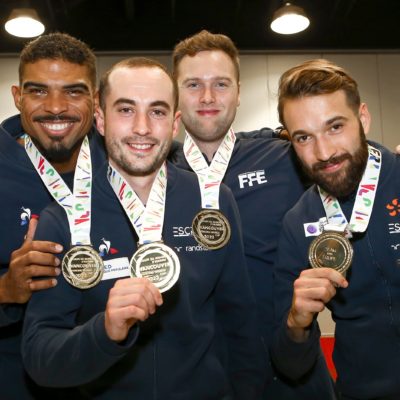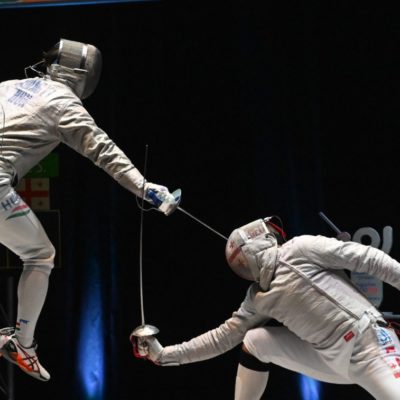 |
| Keeth and Erinn Smart the night of the Men’s Team Sabre silver medal. |
How US Team Captain Jeff Bukantz sold the story of fencing to Showtime.
In 2008, the film crew for Bud Greenspan Presents: America’s Olympic Glory, was in Beijing at the fencing venue, this time hoping to capture a story of redemption for Sada Jacobson as she tried to move from Athens Bronze to Beijing Gold.
What they ended up with was a story of redemption and hope, but from a somewhat unexpected corner.
During her historic gold medal run in Athens at the 2004 Olympic Games, the film team for the Bud Greenspan film series, Bud Greenspan Presents, were on hand to see Mariel Zagunis go from last person admitted into the Olympic competition to the first Olympic Gold medalist in women’s sabre, and the first US Olympic Gold in fencing in 100 years.
Cappy productions creates the film "Bud Greenspan Presents" after each Olympic Games and includes 6 short stories, or vignettes, about an athlete and their unique story.
During the Beijing Games the film crew was on hand. According to US Team Captain Jeff Bukantz, "They were there the first night when we swept (in women’s sabre) and they were all excited…but we all realized there was no drama in that story."
Perhaps the greatest night in US fencing, with a sweep of the individual medals, and it lacked the drama for a good story?
{sidebar id=1}Sydney Thayer (senior producer for Cappy Productions) explained:
"We went to the women’s sabre event with the idea that this time maybe Sada would win and she would finally be rewarded." When Mariel won again, even though the US women swept, it was "almost too much the same story so we ended up not doing it."
"I told Jeff that we wouldn’t be able to do the story especially since they did not win the team. Going flat in the team competition made it just another story about Mariel and we had done that before."
Fast forward a few days in the Olympic competition. Erinn Smart holds off Aida Mohammed to get the US into the gold medal bout against Russia and the team ends up with silver. The next day, the last day of Olympic fencing competition, Keeth and the US men’s sabre squad take make their run.
The US started out exactly the same as they did in Athens – the #7 seed vs. #2 seed Hungary. In 2004, the US upset Hungary, then lost to France in the semi finals and then to Russia in the bronze medal bout. Both losses were 45-44 with Keeth as the anchor.
This time the US faced Hungary again. Hungary was so confident that they would win that they did not even study tape of the US fencers. The US came from behind and prevailed with Keeth as closer.
In the semifinal match, the US faced off against Russia. In 2004, Keeth inherited a 40-35 lead and lost the bout 10-4 to Russian star Pozdniakov. In 2008, Keeth stepped up down 35-40. Keeth ended up winning that match 45-44 for the US in dramatic fashion.
 |
| Keeth Smart rallied and slayed his dragon in a dramatic win over Russia’s Pozdniakov. Photo from Serge Timacheff fencingphotos.com |
In fact, Keeth looked to have been hit by Pozdniakov’s riposte which would have given Russia a 45-43 win, but on review it was determined that Keeth was out of bounds, stopping the action before the attack and riposte that gave Russia their 45th touch.
With a second chance, Keeth won the next two points and put the US into the gold medal match. You can watch that story over at NBC Olympics here.
After the men’s sabre competiton, Bukantz told George Vecsey of the NYT, "The story of this is that Keeth Smart slayed the dragon of Athens."
The iconic story of failure and redemption – plus all of the personal trials that the Smarts had endured – made the story one that had to be told.
Syd highlighted what made the Smart story one to tell: "We usually try to find people that win gold medals…but you can tell when you see it that when two kids come out of the inaugural year of the Peter Westbrook Foundation, and go through what they’ve been through and go return from the devastation of Athens in the men’s team and both win medals, but now their parents aren’t there to see them on the medal stand." Now they return to the PWF and donate their time to the place where they began.
The problem with telling the story is not the story itself, but the visuals:
"As a novelistic story, it’s really easy. Visually it’s more complicated – it’s hard to tell that story. We have to tell (the audience) who scored. The best way to tell it is to use the personal story line behind it. "I don’t want to offend anybody but each point looks the same." In a match where there are 45 points, it’s hard to see what’s the defining moment."
The production crew got so into the story, that they kept adding in pieces until the piece got up to 24 minutes and had to be cut back down to 17. Onto the cutting room floor went the injury delay in Athens when Touya’s hand was pierced by Keeth’s sabre. The focus was tighted on just Keeth and Erinn. Syd explained that he used what Eric Rosenberg said to Keeth after Athens as a guide: "You have a unique thing here Keeth, don’t quit now, you have each other."
This story is ultimately about a brother and sister who navigated this journey together. So that focused the story to be just on Keeth and Erinn.
The US cadre provided their help for the film crew. Notably, Jeff Bukantz helped to arrange the interviews and provide the background story. NYAC’s Eric Rosenberg as well as members of the Peter Westbrook Foundation were interviewed. Carl Borack even provided audio from his video camera of Keeth cheering Erinn on during the women’s team foil event.
All of the stories in this film come from the point of view of a journey being in some way resolved with Beijing.
Bud Greenspan Presents: Beijing 2008 – America’s Olympic Glory premiers on Monday October 19th at 7:00pm EST and PCT. Official listing here.





